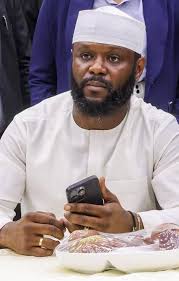LOCAL

"LAGOS APC FACES INTERNAL DIVISIONS AS SEYI TINUBU’S GOVERNORSHIP AMBITIONS STIR CONTROVERSY
Tensions are rising within the Lagos chapter of the All Progressives Congress (APC) over rumors that Seyi Tinubu, the 39-year-old son of President Bola Ahmed Tinubu, is considering running for the governorship of Lagos State in 2027. Although he has not officially announced his candidacy, sources indicate that efforts to rally support for him are already underway, driven by endorsements from youth organizations and Nigerian communities abroad.
If Seyi decides to run and wins, he would make history as the youngest governor in Lagos, surpassing Babatunde Fashola, who became governor at 43 in 2007. Despite this potential for a new chapter in the state's leadership, the news has sparked concerns within the APC, particularly among influential members of the Governance Advisory Council (GAC).
The GAC, a powerful body founded by President Tinubu in 1999, has traditionally had a strong influence on the political direction of Lagos. It has played a key role in selecting governors like Fashola, Akinwunmi Ambode, and Babajide Sanwo-Olu. However, the idea of Seyi Tinubu succeeding Sanwo-Olu has led to divisions within the group. Some members question whether Seyi, with his background as CEO of Loatsad Promomedia, has the political experience required to govern Lagos, a state with complex economic and infrastructural needs.
Critics of the potential candidacy argue that it could represent a political dynasty and create an undemocratic atmosphere. One senior party member from Oshodi-Isolo expressed concern that electing the president’s son could lead to a perception of authoritarianism rather than democratic leadership, especially if President Tinubu is re-elected in 2027.
On the other hand, supporters of Seyi Tinubu argue that political dynasties are common across the globe and that he has the constitutional right to run if the people and party support him. They point to examples of political families in the Philippines, the United States, and Nigeria, such as the Marcoses and the Bush family, to support their stance.
In addition to these debates, there are concerns about Seyi's influence in the upcoming local government elections. It has been reported that he is positioning loyalists to run for key roles, which has raised alarms among some Lagos residents who feel this could interfere with the democratic process.
Another issue that has emerged is the call for the rotation of the governorship seat. Lagos is divided into five administrative districts—Ikorodu, Badagry, Ikeja, Lagos Island, and Epe—but the last four governors have all hailed from Lagos Island and Epe. This imbalance has led some APC members to advocate for the governorship to rotate to districts like Ikorodu or Badagry in the next election.
In response to Seyi’s potential candidacy, a faction within the APC is backing Babajimi Benson, a member of the House of Representatives from Ikorodu Federal Constituency. Benson is viewed as a more experienced candidate who could help address the zoning imbalance.
As the 2027 elections approach, President Tinubu’s silence on the matter has left many within the APC uncertain about the party’s direction. Some party members are calling for the president to make a clear statement on his son’s potential candidacy to prevent further divisions.
The APC faces a challenging road ahead, especially after the party’s loss of Lagos to Peter Obi in the 2023 presidential election. Analysts warn that a controversial or divisive candidate, particularly one seen as part of a political dynasty, could further weaken the party’s influence in Lagos.
The debate over Seyi Tinubu’s candidacy reflects broader concerns within the APC about leadership, fairness, and the future of Lagos governance. As the 2027 elections approach, the party finds itself at a critical crossroads.
"This represents a significant development in our ongoing coverage of current events."— Editorial Board









